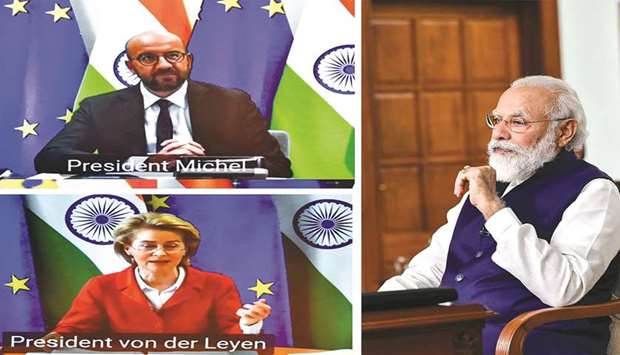Indian and EU leaders vowed to deepen trade ties yesterday as both face the economic shock of the coronavirus epidemic and rising tensions with China.
At a video conference between Prime Minister Narendra Modi and EU chiefs Ursula von der Leyen and Charles Michel, they laid plans for a ministerial-level trade dialogue.
The two giant economies shared bilateral trade of more than $115bn already last year, but efforts to strike a preferential trade deal have moved slowly.
Emerging giant India is traditionally defensive of its right to trade independently under global rules, while Europe’s trade deals seek to bind partners to stricter standards.
But analysts say Delhi and Brussels increasingly recognise their mutual interests in the face of a more assertive China and the looming global economic slump.
“The European Union is India’s largest trading partner and is the largest investor in India,” von der Leyen told reporters after the video summit.
“Yet our overall trade and investment relationship has by no means reached its full potential.”
In India, foreign ministry official Vikas Swarup told journalists after the talks that India aims to integrate domestic production into global supply chains.
“India and the EU have held discussions on this broad-based trade and investment agreement for quite some time. But since 2013, those negotiations haven’t really taken place,” he said.
But after a new European Commission in December last year, “our commerce and industry minister and the EU trade commissioner have met and they have exchanged readiness to engage on the matter.
“The leaders discussed it at our summit today in the context of post-Covid economic recovery priorities on both sides.”
Following the summit, the parties released a joint statement on building a green economy and a roadmap leading to 2025 for the “India-EU strategic partnership”.
The challenge of China was not addressed directly, but the roadmap pointed to a closer alliance between the countries of the European Union and their fellow democracy India.
The vowed to “work together to maintain peace, stability, safety and security, especially in the Indian Ocean and the Pacific, by cooperating to preserve freedom, openness and an inclusive approach in the maritime domain.”
China has ambitious disputed territorial claims in the Pacific.
Europe recently sharply criticised Beijing’s imposition of a new security law on its autonomous territory Hong Kong.

Prime Minister Narendra Modi attends the India-EU Virtual Summit 2020 through video conference with President of the European Council Charles Michel (screen top) and President of the European Commission Ursula von der Leyen, yesterday.
